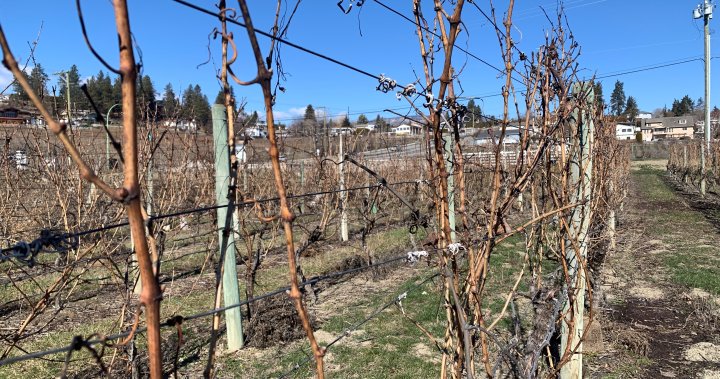The Penticton Chamber of Commerce has been advocating for changes to help wineries that have been severely impacted by crop losses due to extreme weather events. In February, they sent a letter to the provincial government calling for adjustments to manufacturing and licensing requirements. Now, wineries that experienced crop failure are exempt from producing a minimum of 4500 liters of their own wine on-site to keep their license. Additionally, they can apply for a one-year exemption to using 25 percent of products from their own land in British Columbia if they anticipate difficulty meeting this requirement. These changes are seen as crucial for wineries to maintain revenue streams and employment for tasting rooms, preventing insolvency.
One winery that has been significantly affected by the recent extreme weather events is Le Vieux Pin Winery in Oliver. The winemaker and viticulturist, Severine Pinte, stated that they will be producing much less wine from this year’s crop, with a potential 90 percent loss overall in British Columbia. She emphasized the importance of the exemptions granted to wineries, as without them, wineries would not be able to operate, sell their wine, or make any new wine at all. While these changes are a step in the right direction, Pinte highlighted the need for further assistance for the industry, especially considering that it takes vines three to five years to recover after planting.
The impact of the crop losses will be felt in the wine industry for years to come, as it takes time for vines to recover and begin producing grapes again. The licensing requirements were critical for wineries to operate and generate revenue, and without them, many wineries would face financial difficulties and potential insolvency. The exemption to these requirements for land-based wineries affected by crop failures is welcomed news and is seen as a necessary measure to support wineries during this challenging time. Wineries still have wine in stock from previous years, but the inability to meet licensing requirements for the current year would have had a devastating impact on their operations.
Although the changes to licensing requirements are beneficial for wineries in the short term, there is a recognition that more support will be needed in the coming years to help the industry recover and thrive. The three to five-year timeline for vines to recover means that wineries will continue to feel the effects of the crop losses for years to come. Winemakers like Severine Pinte are committed to advocating for additional support for the industry and working with the government and stakeholders to find the best ways to assist wineries in their recovery efforts. The focus now is on ensuring that wineries have the necessary resources and assistance to navigate the challenges posed by the recent crop losses and continue to thrive in the future.
In conclusion, the changes to licensing requirements for wineries affected by crop losses due to extreme weather events are a positive step in supporting the industry during this challenging time. The exemptions granted will help wineries maintain revenue streams and employment for tasting rooms, preventing insolvency and ensuring their continued operation. However, there is a recognition that more support will be needed in the long term to help wineries recover from the crop losses and thrive in the years to come. Winemakers and industry leaders will continue to advocate for additional assistance and work with the government and stakeholders to find the best ways to support wineries in their recovery efforts.


